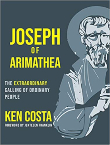You can go to church and hear plenty of sermons about Joseph and his coat of many colors, the Joseph who was sold into slavery by his brothers and rose to become second-highest ruler in Egypt. At Christmas time, you might hear a kudo or two tossed toward Joseph, Jesus’ earthly father.
But, as many times as I’ve been in the sanctuary and in churches from coast to coast, I can’t recall even once hearing a full sermon about Joseph of Arimathea. And now, Ken Costa has found a way to write an entire book about this often overlooked fellow, who stepped out of the shadows long enough to minister to Jesus post-mortem and merits all of 19 verses spread across the last chapters of all four Gospels. That, in and of itself, is quite a feat.
Moreover, he didn’t just write some historical treatise about a wealthy man who followed Jesus in secret. He shows how this Joseph of Arimathea is relevant to every one of us—”people of the fine print,” as Costa puts it.
What the Scriptures say of this footnote in history is that he was a rich man, a secret disciple (Matthew 27:57-60). That he was a respected member of the Jewish leadership who was looking for the Kingdom of God (Mark 15:43-46). That he “had not consented to their decision,” speaking of the leaders who schemed to have Jesus crucified (Luke 23:50-55). And that he partnered with another secret disciple, Nicodemus, to bury the Lord’s body (John 19:38-42).
That’s 19 verses. Now, go write 137 pages about it and let me know how it goes. Here’s how Costa spends the space: demonstrating how we can lead from a minority position, encouraging the vast majority of us who consider ourselves ordinary as to how we can live with extraordinary impact, and educating us on what God can do in the midst of the most humble of circumstances.
He writes that, “It’s a strange kingdom when salvation is born in the dirty soil of destitution and dependency, rather than the fertile soil of riches and success,” and yet he shows that having riches and success isn’t a crime. The test is whether you can put those riches and success in their proper place as servant rather than master, and he boldly challenges our oft-repeated notions of stewardship. “Affluence can easily be stewarded with generosity in giving or tithing,” Costa writes. “It is influence that is more difficult to steward.”
Jesus didn’t need Joseph’s service for long. As the angel asked Jesus’ followers at the tomb early that Sunday morning in the coolest question ever posed, “Why seek ye the living among the dead?” (Luke 24:5) Costa capably shows us that everything Joseph did for Jesus in the dark, seemingly hopeless moments in the aftermath of the Savior’s death, we can do for Jesus’ in the glorious light of His resurrection.
“Resurrection light is not just for the people who get all the air time,” Costa writes. “It’s not just for the Peters and the Pauls. It’s for the hidden figures, the people of the small print, those who feel marginalized as if they are but footnotes to the story of others.”
Costa shows us that like Esther, there will surely be a moment for each of us, in whatever calling that the Lord has given us, when we will come to the forefront “for such a time as this.” Maybe it will go largely unseen. But not by God, Who sees what is done in secret and for Whom it counts most. It is an excellent read, a smooth flow from start to finish, and as such heartily merits the Dove-approved seal for All Ages.
The Dove Take:
Amid the ordinary and overlooked, the unseen and unheralded, there is room at the cross and in its power for those who will take it up to make an extraordinary impact.





